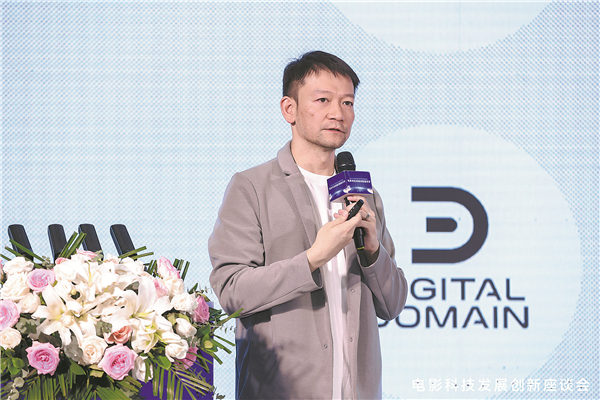
[ad_1]

As digital applied sciences convey new alternatives and challenges, China’s movie trade must strengthen collaboration throughout the film-production chain and obtain autonomy over core applied sciences, specialists confused at a latest symposium.
The Film Technology Development and Innovation Symposium happened in Pingyao, Shanxi province, on Oct 12, highlighting the constructing of a strong movie trade with technological self-sufficiency.
The symposium was hosted by the China Film Administration, and collectively organized by the China Research Institute of Film Science and Technology in addition to the Shanxi provincial publicity division.
More than 140 representatives from movie bureaus, manufacturing firms, filmmaking gear producers, cinemas and trade associations joined the symposium, and 9 specialists gave keynote speeches on the home and worldwide tendencies in movie know-how improvement, software and innovation.
According to Lu Liang, deputy director of the China Film Administration, over the previous decade, China’s movie know-how has been carefully following internationally superior requirements and made improvements in areas throughout the trade chain, together with manufacturing, distribution, screening, copyright safety, infrastructure, technical requirements and high quality assurance.
“Together, we aim to seek the path for China’s film technology to achieve self-reliance and high-level development, as well as exchange successful experiences and innovative ideas on how technology can empower the Chinese cinema in the new era,” Lu says.
“Entering the era of a digital economy and big science, film research and technology applications have become more complex, systematic and collaborative. We hope that all segments of China’s film industry chain will collaborate and leverage their strengths, to fortify underdeveloped areas and achieve independence in core film technologies.”
Guo Fan, director of blockbuster sci-fi movie franchise The Wandering Earth, says that his movie crew had experimented with synthetic intelligence within the making of the second installment and performed analysis at movie studios and know-how firms overseas.
By sharing movies of the work he and his colleagues carried out on the studio, he confirmed that their AI know-how will be utilized to varied duties, similar to creating life like digital characters, re-creating the voices and appearances of actors, and even growing old characters by about 25 years with out the necessity for make-up.
He says that whereas delving into AI applied sciences, he was regularly greatly surprised by the outcomes. For occasion, he used to be taught drawing as a baby, and it takes years of follow to finish drawings with the identical stage of intricacy generated by AI in a matter of seconds.
“When I saw the videos (generated by AI), they stirred great emotions within me, particularly a sense of anxiety. I couldn’t help but wonder what lies ahead and how we should prepare for the rapid pace of technological advancement,” Guo says.
After a subject journey of three months to internationally famend AI conferences and labs, he was proud to say that China’s personal AI applied sciences are advancing at an identical tempo with worldwide tendencies, and that, sooner or later, the know-how may affect the movie manufacturing and creation processes.
“Based on the technological changes, our creative process will undergo changes. For example, the scriptwriting based on large language models will provide us with numerous possibilities and assist us in handling many low-value tasks,” Guo says.
“It enriches our creative process by offering more possibilities, allowing us to filter useful content and derive inspiration from the generated text. And the future of photography and lighting may lean toward real-time rendering and generating.”
Zhang Wei, head of the China Research Institute of Film Science and Technology, says that the present period, characterised by data know-how, options convergence and innovation, which provides numerous industries the chance to interrupt free from standard operational fashions and create options which can be extra versatile and environment friendly.
“Given the strong technological nature of filmmaking, its development inevitably follows the trends and patterns of technological advances. The current global film industry, in terms of production, screening and overall development, aligns with the digitalization trend and shows the characteristics of convergence and innovation,” Zhang says.
According to Zhang, there are 4 points for China’s movie trade to spotlight in its future improvement — utilizing high-tech codecs in movie manufacturing and screening, constructing a complete movie manufacturing system, deepening impartial innovation in movie know-how, and cultivating technological and inventive expertise.
[adinserter block=”4″]
[ad_2]
Source link